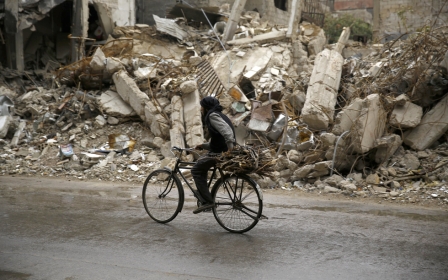The flawed prescription for peace in Syria: More war

Russian military intervention in Syria is a real game changer; there can be no denying that. But whether it will escalate the long running and intractable conflict to a new more dangerous phase, or ultimately help set the ground work for an eventual resolution remains to be seen.
For their part, Syrians are as divided as ever over this latest escalation and intervention. Supporters of the government see Russia as their saviour, the proverbial knight in shining armour, while those who support the insurgents see Russia as an aggressor and occupier with the blood of Syrian people on its hands. A large part of Syria’s population, however, no longer cares about the politics of the conflict, or who the good guys and bad guys are at any particular point in time; they only care about day-to-day survival and the war coming to end, and they don’t see that happening any time soon.
Russia along with Iran are the Syrian regime’s sturdiest allies, without whose steadfast support it would have long ago collapsed. Driving that point home was Bashar al-Assad’s dramatic official visit to Moscow last week; his first trip abroad since the conflict in Syria began almost five years ago. Not only did it cement his status as Russia’s man in the region, it also put to rest speculation it was about to cut him loose. This unexpected visit greatly frustrated the array of regional and global powers trying to oust him and put an end to his rule. They accuse Moscow of launching its military campaign with the sole purpose of propping up Assad and his regime, despite its protests to the contrary. Russia claims its airstrikes only target jihadi and terrorist groups, all valid targets as far as it’s concerned because of the serious threats they pose to Russian national security.
A flurry of diplomacy and hastily convened meetings have failed to reach any consensus on the way forward in Syria, the major sticking point as usual being the impasse over the fate of Assad. Moscow would like to see him lead a transitional period and then run in elections, which he stands a good chance of winning. But given the fractured social and territorial state of Syria and the ongoing instability and violence, a free and representative ballot is next to impossible. The powerful backers of his opponents and various insurgent groups want to see him leave immediately or after a very short time, either way they envision no future for him in Syria.
Prolonging suffering and conflict
This impasse poses the greatest risk of conflict escalation, as several nations have now pledged to ramp up their already substantial military and financial support to rebel groups. Invariably, this means prolonging the conflict with all the continued suffering that entails. It seems preposterous and highly unethical to subject an entire nation to annihilation over the fate of one man, but that is sadly the reality in Syria. Of course Assad’s significance is not only in his person, but as a lynchpin of the former regional order and the power dynamics that shaped it for decades.
This order is now in the throes of a deadly tug of war between regional rivalries and global powers vying for supremacy and hegemony. Syria is one such theatre where they are facing off by playing a very dangerous and irresponsible game of escalation and inter-Islamic sectarian militarisation and incitement to add fuel to the fire of their proxy confrontations. This fire threatens to burn everyone in the region and beyond, with the first scorch being the spawning of the hellish horror that is ISIS out of the ensuing chaos.
As Russian intervention has clearly tipped the balance of power on the ground in the Syrian government’s favour, insurgents and their backers will now be trying very hard to change that dynamic, reversing it and bringing it back to a stalemate and a slow war of attrition.
‘Unspoken alliances’
Russia’s military objective at this stage is to “soften up” insurgent strongholds and forward positions and disrupt their supply lines, paving the way for Syrian loyalist forces to advance and retake strategic territory. In Latakia the objective is to push back the insurgents and deny them a launching pad for attacks deep into the regime’s heartland on the coast.
Around Damascus it is to further secure the capital, while in the centre it is to recapture and secure the 350 km-long Damascus-Aleppo highway; a major artery large parts of which have been under rebel control for over three years, especially in Idlib province. In Aleppo, the objective is to reach the Kweires military airport, long besieged by ISIS. This will provide a much needed moral boost to regime forces, as well as skyrocket Russia standing amongst government supporters and their regional allies.
Already significant gains by government forces and local and foreign-supporting paramilitary militias in south Aleppo on long frozen fronts, have been met with an unprecedented “unspoken alliance” between rival jihadi groups. It seems they’ve put aside their differences for now, and have coordinated an attack on the only supply route to government-controlled Aleppo city, effectively besieging around two million people and cutting off military supplies to the ongoing offensive there.
As ISIS launched suicide car bombs and captured parts of the long road, various rebel factions lead by al-Nusra attempted to cut off the route at the entrance to Aleppo. This unprecedented coordination between former sworn jihadi enemies is an ominous harbinger of what may come as a result of Russian intervention, but only time will tell if those fickle alliances will hold and morph into a “super jihadi” merger in the face of a shared existential threat.
More war for peace?
Any hopes for an imminent resolution to the Syrian conflict are evaporating fast, and it appears all sides are as entrenched as ever. The Russians hope that by allowing the Syrian government to regain the momentum on the ground, the more moderate rebel factions can be persuaded - under military duress - to come to the negotiating table.
Conversely, this Russian tactic of more war to bring about peace is the exact same strategy being pursued by backers of the insurgents, most notably the US. The belief was that sustained and mounting military pressure on Assad, especially around the capital Damascus, would eventually persuade him to come to the negotiating table and make substantial concessions. There is no real desire to see his regime suddenly collapse, as this would throw the entire country into an ultra-extremist-dominated anarchy.
This strategy did not work, and there’s no indication that Russia’s will fare any better. But with the lack of any real consensus, the military option seems to be the only path anyone is willing to pursue in Syria for now, despite repeated and ultimately hollow rhetoric that a political solution was the only way to resolve this conflict.
We’re left with the very real prospect that the war in Syria will soon be reaching an even higher crescendo of wanton mayhem and destruction, should the joint Russian-Syrian offensive stall and ultimately fail in the face of better armed and more radicalised resurgent rebel alliances. This would leave the country even worse off than it is now, and the continued carnage and increasing desperation will drive many hundreds of thousands more to join the ever-growing refugee exodus out of this shattered land. This then, is Russia’s gambit in Syria.
- Edward Dark is MEE's Aleppo-based columnist and writes under a pseudonym.
The views expressed in this article belong to the author and do not necessarily reflect the editorial policy of Middle East Eye.
Photo: Displaced Syrian children from the town of Daraa, sit at a makeshift school set up in a tent provided the United Nations agency for refugees UNHCR, in the Daraa area in southern Syria, on 27 October, 2015
Stay informed with MEE's newsletters
Sign up to get the latest alerts, insights and analysis, starting with Turkey Unpacked
Middle East Eye delivers independent and unrivalled coverage and analysis of the Middle East, North Africa and beyond. To learn more about republishing this content and the associated fees, please fill out this form. More about MEE can be found here.





